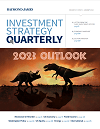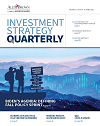As billions of fans eagerly await the 2022 World Cup, CIO Larry Adam draws parallels between the globe’s most popular sport and the current investing environment.
To read the full article, see the Investment Strategy Quarterly publication linked below.
Like soccer fans following their favorite players, investors have no small amount of anticipation about every move central banks are making on the global economic playing field. In this intense time of soaring inflation and interest rates, what is the Federal Reserve’s (Fed’s) game plan? As the markets recalibrate expectations and evaluate risks on the field, this is a high-pressure time that requires finesse.
This fall, all eyes will be on the Fed as it pursues its goal of winning against inflation. The further it raises interest rates above 4% – Raymond James’ forecast is 4.5% – the greater the probability of a recession. As a result, we expect the U.S. economy to experience a mild recession starting early next year. We also foresee potential downside risk for a lackluster housing market, elevated energy prices and weak consumer sentiment.
A balanced defense is imperative in the World Cup – and in managing portfolios, too. Yet there have been few investments that have not been penalized as both the bond and equity markets have been sidelined with painful losses. In fact, the correlation of bonds to equities is the highest we have seen in nearly 25 years. Going forward, however, bonds ought to provide some defensive buffer if yields fall amid a struggling economy. Importantly, yields are attractive for the first time in years as the 10-year Treasury yield nears 4%. Our view is that it will ease from this peak as the economy slows and inflation abates.
We are approaching halftime in President Biden’s term with midterm elections just around the corner. At this point, we expect Congress will be split. With gridlock on Capitol Hill, the Biden Presidency will become a game of two halves as major game changing legislation is unlikely to be passed. If so, political policy risk (specifically the potential for increased taxes) will be reduced until the next election cycle.
The equity crowd has been hushed, stunned as stocks have succumbed to a bear market, declining more than 20%. Significant injuries have hampered the markets – rising inflation, higher interest rates, a stronger dollar and tumbling earnings growth revisions. But those are likely already priced into the market, and three factors could lead to a rebound in equities:
- Better-than-feared third quarter earnings could spark a rally, as they did in the second quarter.
- Inflation deceleration could halt further Fed rate hikes.
- Midterm elections have historically had an impact, regardless of the outcome. In the last 19 midterms, the S&P 500 has been positive every time 12 months after the elections (up, on average, ~14%).
Even if a mild recession ensues, we should be beyond it by the end of next year and the equity market tends to be forward-looking. That’s why we expect the S&P 500 to reach ~4,400 by year-end 2023.
From a sector perspective, energy, healthcare and financials remain our favorites. Investors seeking to add value to their portfolio longer term may wish to consider small-cap stocks, featuring an attractive 30% discount relative to the S&P 500.
The World Cup can be full of surprises – good and bad for fans. Until inflation abates and Fed policy clarifies, market volatility is likely to continue. But despite some of the setbacks we’ve experienced this year, we encourage investors to remain engaged and not watch from the sidelines. Patience and sticking with your game plan can be critical to success, and selectivity will be key. Diversification, asset allocation and a long-term mindset are timeless, critical skills for any investor. And while this year’s performance in most major asset classes has been disappointing, everyone loves a comeback.

Read the full
Investment Strategy Quarterly
Read the full
Investment Strategy Quarterly
All expressions of opinion reflect the judgment of the Chief Investment Office and are subject to change. This information should not be construed as a recommendation. The foregoing content is subject to change at any time without notice. Content provided herein is for informational purposes only. There is no guarantee that these statements, opinions or forecasts provided herein will prove to be correct. Past performance may not be indicative of future results. Asset allocation and diversification do not guarantee a profit nor protect against loss. The S&P 500 is an unmanaged index of 500 widely held stocks that is generally considered representative of the U.S. stock market. Keep in mind that individuals cannot invest directly in any index, and index performance does not include transaction costs or other fees, which will affect actual investment performance. Individual investor’s results will vary. Investing in small cap stocks generally involves greater risks, and therefore, may not be appropriate for every investor. International investing involves special risks, including currency fluctuations, differing financial accounting standards, and possible political and economic volatility. Investing in emerging markets can be riskier than investing in well-established foreign markets. Investing in the energy sector involves special risks, including the potential adverse effects of state and federal regulation and may not be suitable for all investors.
Markets & Investing Members of the Raymond James Investment Strategy Committee share their views on...
Markets & Investing Review the latest Weekly Headings by CIO Larry Adam. Key Takeaways ...
Technology & Innovation Learn about a few simple things you can do to protect your personal information...
